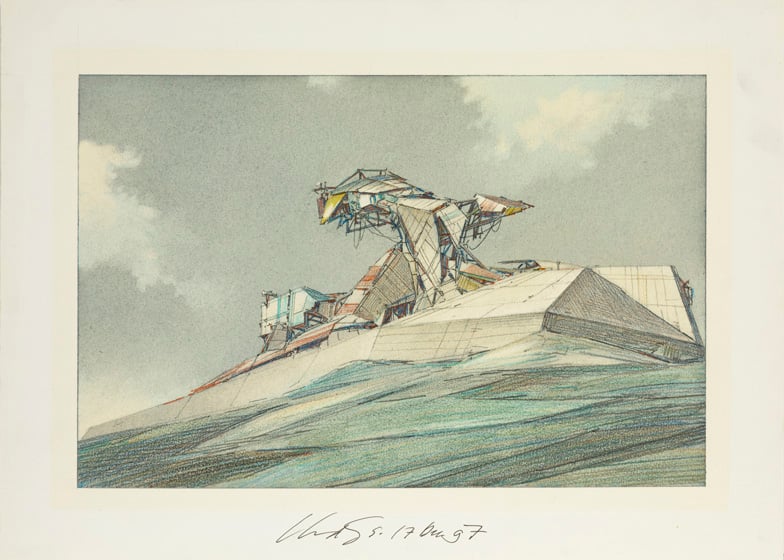Following the sad news that experimental architect and artist Lebbeus Woods passed away last week, here's a look back at some of his early drawing projects from the 1980s.
Top: Centricity: Geomechanical Towers, 1987-1988
Above: Centricity: Aero-Livinglab, 1986-1987
Taken from an exhibition held at the Friedman Benda gallery in New York earlier this year, the drawings show the dystopian architectural landscapes of Woods' imagination, including the Centricity and A-City projects that explore the political nature of architecture and its capacity to affect society.
Above: Centricity, 1987
In Centricity, Woods drew a mythical city where towers appear to grow up out of the landscape, bearing a closer resemblance to machines than buildings, but with the same organic shapes that are more commonly found in nature.
Above: Centricity, 1987
In a 1988 interview with Skala magazine, the architect said: "What I'm most interested in recently, in the end of the Centricity series, is this idea of curvilinear things, of double curvations and triple-curvations, of hyperbolic geometry and compound geometry, so you are not just dealing with pure Euclidean forms."
Above: Centricity, 1987
The A-City project was completed around the same time and investigates the relationship between technology and patterns of life.
Above: A-City: Sector 1576N, Quad 2NR, 1987
"In these places I'm drawing, the high-technology is invisible, because it's already so miniaturised, and so compact, and so industrialised, that it's not a major physical artefact," said Woods. "And the city is indeed low-technology in the sense that people are participating in the making of it."
Above: A-City: Sector 1576N (Aerial), 1986
The 4 cities drawings predate both of these series and show the beginnings of Woods' ideas about deconstruction, replacing traditional building features with abstract forms and symbols.
Above: 4 Cities & Beyond, Region A (2), 30, 1983
"I hope that what I draw reflects my love of building and my love of actually making architecture," Woods told Skala. "I think that these things could be built. Of course some of them are probably technologically not possible at the present moment, maybe never. But by and large, I would like them to be built, and to see what we can do with them, to see what they would mean to us."
Above: 4 Cities & Beyond, Region R (2), 12, 1983
See more stories about conceptual architecture »
Images courtesy of Friedman Benda and the artist.

